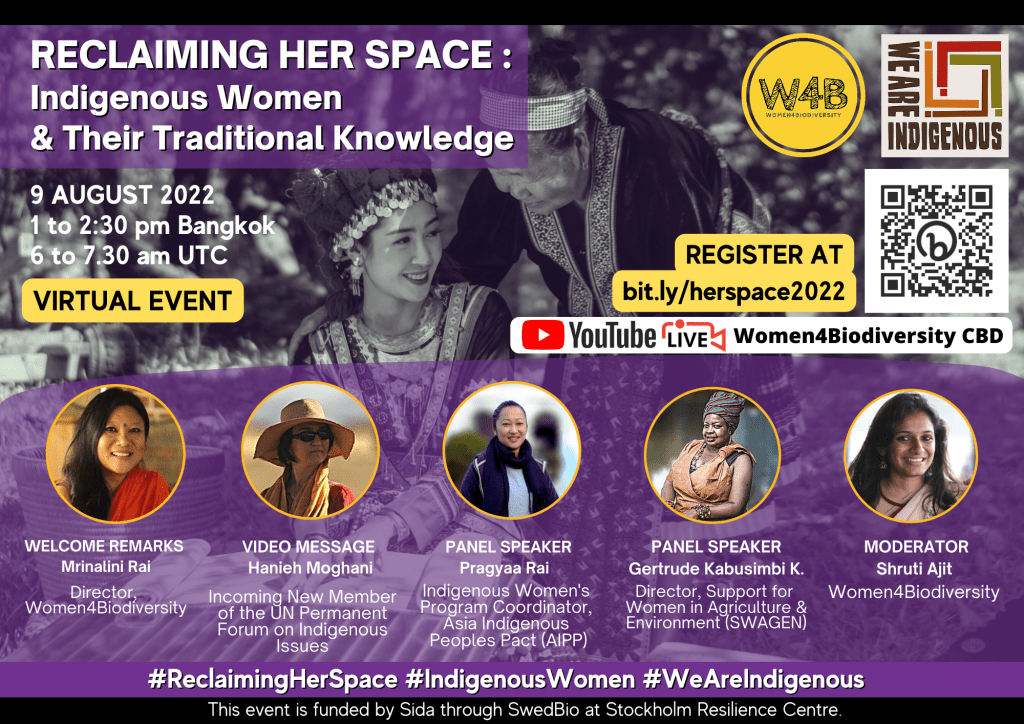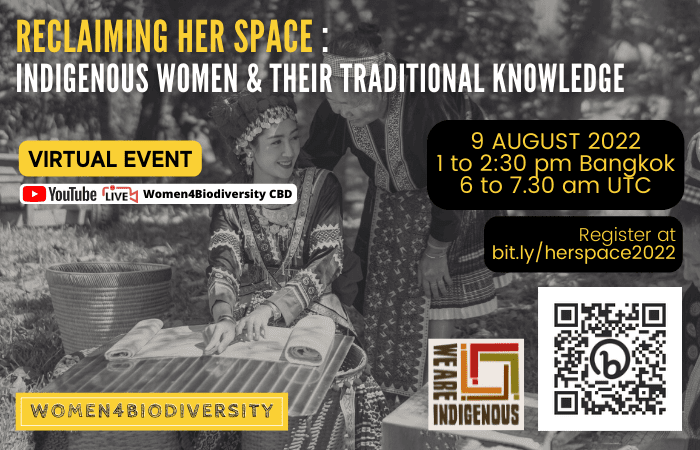REGISTER HERE.
Event title: Reclaiming Her Space: Indigenous Women and Their Traditional Knowledge
Host: Women4Biodiversity
Funding: This event is funded by Sida through SwedBio at Stockholm Resilience Centre.
Date: 9 August 2022, Tuesday
Time: 1 to 230 pm, Bangkok time (GMT +7), 6 to 730 AM UTC
Venue: Virtual
Overview
Every year, the International Day of the World’s Indigenous Peoples is celebrated on 9 August. The date marks the inaugural session of the Working Group of Indigenous Peoples in 1982. This year’s theme is: “The Role of Indigenous Women in the Preservation and Transmission of Traditional Knowledge.” To commemorate this occasion, Women4Biodiversity is organizing this virtual event.
Objectives
- Commemorate International Day of the World’s Indigenous Peoples 2022, themed “The Role of Indigenous Women in the Preservation and Transmission of Traditional Knowledge”
- Share and amplify the voices of indigenous women from the global south in international events
- Build an advocacy roadmap on human rights and gender equality in biodiversity conservation to CBD COP 15
Intended Audience
This event is intended for Parties to the CBD, gender-, human rights-, and environment-focused practitioners and their networks, as well as those working on integrated, cross-sector policy and programming. The event aims to also inform the general public experiences, knowledge, lessons learnt and promising scientific and technical knowledge, practices of indigenous women and their rights and the future of biodiversity.
Speakers
WELCOME REMARKS:
Mrinalini Rai (Director, Women4Biodiversity)
VIDEO MESSAGE:
Hanieh Moghani (Incoming New Member of the Permanent Forum on Indigenous Issues)
PANEL:
Gertrude Kabusimbi Kenyangi, Uganda (Director, Support for Women in Agriculture and Environment (SWAGEN))
Pragyaa Rai, Nepal (Indigenous Women’s Program Coordinator, Asia Indigenous Peoples Pact (AIPP))
VIDEO:
Network for the Indigenous Peoples of Solomon, Solomon Islands
MODERATOR:
Shruti Ajit (Women4Biodiversity)
Background and further event details
Indigenous women are agents of change.
Indigenous women cover every geographic region in the world, from the lands to the seas. They represent diverse and rich knowledge, history and skills that sustain the well-being of indigenous communities. They are the transmitter of intergenerational knowledge, retaining their roles as stewards of the lands and knowledge bearers of food and medicine. Their knowledge and practices help address the global crisis of climate change, conserve biological diversity and build resilience amid the Covid pandemic.
However, despite their contributions, they are still seen as “vulnerable”, “beneficiaries” where they should be recognized as partners and as agents of change. There is a growing recognition of indigenous women in decision-making processes at some levels, yet they still remain underrepresented and on the sidelines, their contributions treated insignificantly.
Traditional knowledge is holistic and not fixed in time; it changes, adapts and evolves, with a considerable gender dimension.
Biodiversity is crucial for indigenous women for their survival and for the survival of their families, communities and culture. The knowledge associated with biological diversity and sustainable use depends on the vitality of biodiversity. Any change in loss of biodiversity will impact the lives of indigenous women and girls – their health, identity, culture and well-being.
The Convention on Biological Diversity (CBD) in its preamble, recognizes “the vital role that women play in the conservation and sustainable use of biological diversity” and affirms “the need for the full participation of women at all levels of policy-making and implementation for biological diversity conservation”. A specific framework for the participation of indigenous women is found in the programme of work (Task 4) on the implementation of Article 8 (j) and related provisions of the CBD regarding participatory mechanisms for indigenous and local communities.
The CBD will adopt the post-2020 global biodiversity framework at the Fifteenth Conference of the Parties (CBD COP 15) this December, a pivotal moment for women’s rights and gender equality in a framework that is looking to living in harmony with nature, which cannot happen without women.
This International Day of Indigenous Peoples, let us recognize indigenous women’s contributions in traditional knowledge and practices in natural resource management and biodiversity conservation and restoration. Let’s keep #ReclaimingHerSpace!


